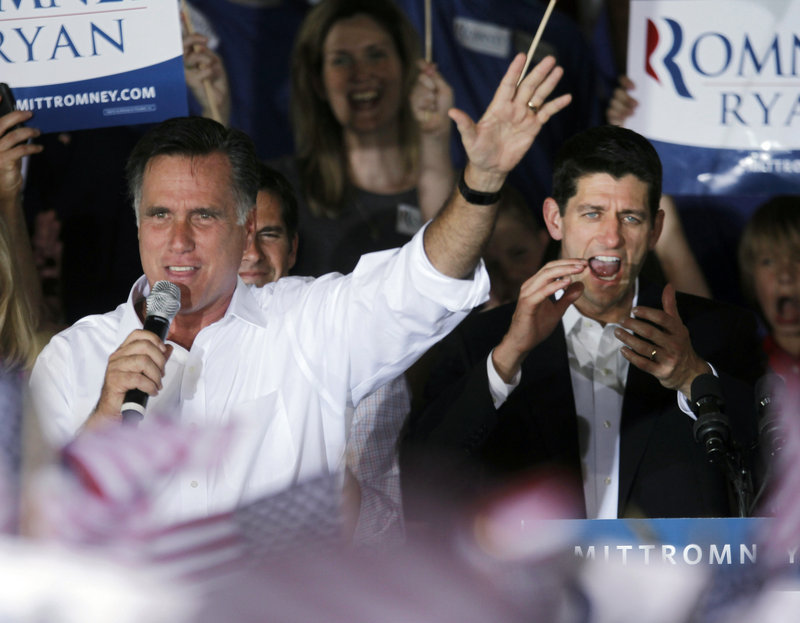WASHINGTON — Mitt Romney’s pick of Rep. Paul Ryan for the Republican presidential ticket brings clarity to the stark election-year choice for voters — the competing Democratic and GOP visions about the size and role of the federal government in Americans’ lives.
Ryan is synonymous with his revolutionary budget that slashes spending for safety-net programs for the poor, remakes Medicare and cuts personal and corporate taxes while pushing the deficit down to a manageable level. It turns the tea party dream of a scaled-back, less involved government into hard-core reality.
“America is more than just a place … it’s an idea. It’s the only country founded on an idea,” Ryan said Saturday in Virginia as Romney introduced his vice presidential choice. “Our rights come from nature and God, not government. We promise equal opportunity, not equal outcomes.”
With Romney’s embrace of Ryan, it is now the Romney-Ryan budget and blueprint for the future.
President Obama, who repeatedly talks up the November election as a profound choice for the country, has rejected the Ryan approach as “thinly veiled social Darwinism.” The Democrat and former community organizer sees government as a place with enough resources to help the less fortunate.
The Ryan budget, Obama said in April, “is antithetical to our entire history as a land of opportunity and upward mobility for everybody who’s willing to work for it; a place where prosperity doesn’t trickle down from the top but grows outward from the heart of the middle class.”
Roughly three months before the election, Romney’s choice clearly defines the fault lines and establishes the narrative for the election, one that Republicans and Democrats, liberals and tea partyers will echo in congressional and gubernatorial races. The outcome in November will have far-reaching implications for looming fiscal crises in the year’s final days.
On the grass-roots level, the selection of the 42-year-old Ryan, one of the House’s intellectual conservatives and Budget Committee chairman, energizes a GOP base wary of the Massachusetts governor and architect of the state’s health insurance program dubbed “Romneycare.”
Conservatives, from The Wall Street Journal editorial page to the rank and file, had been clamoring in recent days for Ryan. The timing of the announcement came as polls showed Obama with a narrow advantage and the number of undecided voters diminishing, underscoring the need for Romney to act fast.
“It’s absolutely fantastic,” Sal Russo, a longtime Republican operative and founder of the Tea Party Express, a well-funded wing of the populist movement, said in an interview. “He’s willing to go out there and tackle tough issues. The American people want somebody to make the tough choices.”
Russo said his organization had polled its 17,000 members, and Ryan and freshman Sen. Marco Rubio of Florida were the favorites for the No. 2 spot on the GOP ticket.
The conservative reward of Ryan also carries a significant political risk — and Democrats wasted no time in making it a top talking point.
The Ryan budget would scrap the current Medicare system that the nation’s seniors have enjoyed for decades in favor of a voucher program for those under 55 today. Starting in 10 years, the plan also calls for gradually raising the Medicare retirement age from 65 to 67.
Democrats immediately sounded the alarm about the implications of changing the popular entitlement program, a warning certain to resonate in battleground states such as Florida, Iowa and Pennsylvania — states with the heaviest concentration of those 65 and over.
“In selecting Paul Ryan, Mitt Romney has crystalized the contrast of this election,” said Rod Smith, chairman of the Florida Democratic Party. “Ryan is the architect of Romney’s extreme budget plan which would end Medicare as we know it, increasing the healthcare costs for Florida’s seniors by thousands every year.”
The state’s senior U.S. senator, Democrat Sen. Bill Nelson, who faces a stiff challenge in his bid for another term, quickly posted on Facebook.
“Romney VP pick bad for seniors. Signals an end to Medicare as we know it. My commitment to Medicare never stronger,” Nelson said.
Democrats are certain to replay past Republican criticism of the Ryan budget.
Newt Gingrich, the former House speaker and one-time Republican presidential candidate, referred to Ryan’s plan to overhaul Medicare as “right-wing social engineering.” He later apologized.
Florida Rep. Connie Mack, who hopes to win the Republican Senate nomination Tuesday, said in April of the Ryan budget: “You know that budget was a joke, doesn’t balance the budget for years.”
An aide later clarified that Mack was referring to the voting process in which Republican-passed legislation in the House goes nowhere in the Democratic-controlled Senate.
Mack’s deficit-cutting plan calls for cutting one penny from every federal dollar spent.
Republicans see Ryan, a Catholic from Wisconsin who could appeal to blue-collar voters, as an appealing complement to Romney, a Mormon and multimillionaire.
But Ryan has tangled with the U.S. Conference of Catholic Bishops and others in the church over his budget, which would cut Medicaid, food stamps, Pell Grants and a host of other programs that directly help the nation’s poor.
Ryan had said the budget is based on Catholic social teaching. But in a letter, the Rev. Thomas J. Reese called that nonsense.
“I am afraid that Chairman Ryan’s budget reflects the values of his favorite philosopher Ayn Rand rather than the gospel of Jesus Christ,” said Reese, a Jesuit priest and senior fellow at the Woodstock Theological Center at Georgetown University. “Survival of the fittest may be OK for social Darwinists but not for followers of the gospel of compassion and love.”
Romney insisted Saturday that Ryan is intent on creating opportunities for all Americans.
“Paul is in public life for all the right reasons — not to advance his personal ambitions but to advance the ideals of freedom and justice, and to increase opportunity and prosperity to people of every class and faith, every age and ethnic background,” Romney said.
Send questions/comments to the editors.



Comments are no longer available on this story